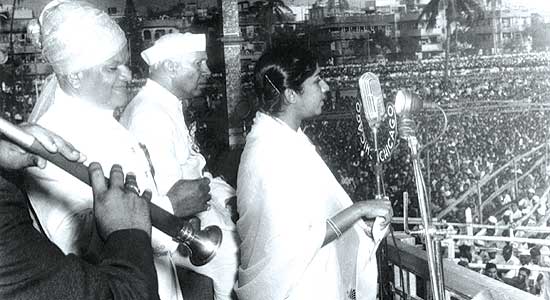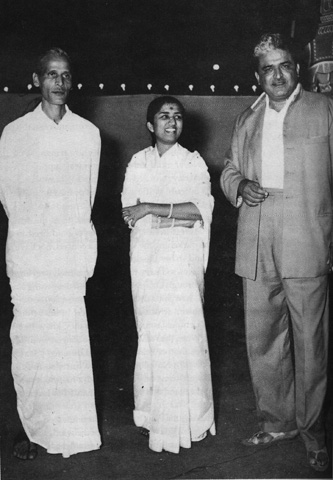
A rare photograph depicting Lata Mangeshkar’s performance of “ai mere vatan ke logo” at the Ramlila Maidan in New Delhi on Republic Day,1963
On behalf of Mrs. 55 and me, I’d like to wish all of our readers a happy Indian Independence Day! In celebration of this holiday, we have provided the lyrics and translation for an all-time patriotic classic: ai mere vatan ke logo. Although this song is not technically a Bollywood song, all of the artists involved in its production are legends of the Hindi film industry: composer C. Ramachandra, poet Kavi Pradeep, and of course, singer Lata Mangeshkar. Kavi Pradeep was inspired to write the lyrics of this poem after being moved by the losses India suffered during the Sino-Indian War of 1962. His tribute to the Indian soldiers who fought in the war has become immortalized in this touching anthem, which is remembered today as one of the finest Hindi songs in the patriotic genre.
Even a song like this, however, was not immune to the drama of the Bollywood industry. It has been reported by journalist Raju Bharatan that C.Ramachandra originally composed this song as a duet between Lata and her younger sister Asha Bhonsle. Allegedly, Lata managed to coax her sister out of the situation using questionable tactics and went on to record the song as a solo because she wanted it for herself. If this story is not merely Bollywood gossip, I certainly don’t condone the lack of sisterly love–but I can say that you’d be hard-pressed to find anyone who thinks Lata didn’t do complete justice to this gem.
In fact, a popular story has been recounted over the years about how Prime Minister Pandit Jawaharlal Nehru was moved to tears when Lata debuted this number at the Ramlila Maidan in New Delhi just two months after the war ended. Lata narrates this incident in her own words:
Following the Chinese attack on India in 1962, Pradeep ji wrote this song and I sang it for the first time in Delhi on Republic Day on 26th January, 1963. C. Ramchandra conducted the few musicians who were performing on stage with me. That year, many stars and music directors from Bombay were in Delhi, including Dilip Kumar, Raj Kapoor, Naushad Ali, Shankar-Jaikishan and Madan Mohan. Once I finished singing, I sat down behind the stage and asked for a coffee.
Mehboob Sahib came rushing to me and said: ‘Lata! Where is Lata? Panditji is calling you.’ I followed him outside and when Pandit ji saw me, he stood up. Indira ji and many leading politicians were there too.
Mehboob Sahib introduced me saying: ‘This is Lata Mangeshkar.’ He said: ‘beTii, tum ne aaj mujhe rulaa diyaa’ [Child, you have brought tears to my eyes today].
Given the occasion, we hope that you’ll take a moment to listen to this evergreen patriotic anthem and commemorate the brave heroes who have fought to protect the freedom of our beloved motherland over the years. Jai Hind!
–Mr. 55
Aye Mere Watan Ke Logo: Lyrics and Translation
ai mere vatan ke logo, tum khuub lagaa lo naaraa
Oh, my fellow citizens! Chant slogans in praise of our country.
yah shubhdin hai ham sab kaa, laharaa lo tiiranga pyaaraa
This is an auspicious day for us all, so fly our beloved tri-color flag.
par mat bhuulo siimaa par viiro.n ne hai praan ga.nvaaye
Yet, do not forget that brave soldiers have lost their lives on our borders.
kuchh yaad unhe.n bhii kar lo, jo laut ke ghar na aaye
Remember those who have not returned home.
ai mere vatan ke logo, zaraa aa.nkh me.n bhar lo paani
Oh, my fellow citizens! Shed a few tears.
jo shahiid hue hai.n unkii, zaraa yaad karo qurbaanii
Remember the sacrifice of those martyrs.
tum bhuul na jaao unko, is liye suno yah kahaanii
Listen to this story so that you do not forget them.
jo shahiid hue hai.n unkii, zaraa yaad karo qurbaani
Remember the sacrifice of those martyrs.
jab ghaayal huaa himaalay, khatre me.n paDii aazaadii
When the great Himalayas were wounded and our freedom was in danger,
jab tak thii saa.ns laDe ve, phir apnii laash bichha dii
They fought until their last breath and then laid their corpses to the ground.
sangiin pe dhar kar maatha, so gaye amar baliidaanii
Resting their heads on bayonets, these immortal martyrs fell into an eternal sleep.
jo shahiid hue hai.n unkii, zaraa yaad karo qurbaanii
Remember the sacrifice of those martyrs.
jab desh me.n thii diivaalii, ve khel rahe the holii
When our country celebrated Diwali, they were playing Holi on the battlefield.
jab ham baiThe the gharo.n me.n, ve jhel rahe the golii
As we sat comfortably in our homes, they were firing bullets.
the dhanya javaan ve apane, thii dhanya vah unkii javaanii
Blessed were those soldiers, and blessed was their youth.
jo shahiid hue hai.n unkii, zaraa yaad karo qurbaanii
Remember the sacrifice of those martyrs.
koii sikh koii jaaT maraaThaa, koii gurkhaa koii madaraasii
Some were Sikh, Jaat, or Marathi; some were Gurkha or Madrasi.
sarhad par marnevaala har viir thaa bhaaratvaasii
But each man who died on the border was an Indian,
jo khuun giraa parvat par, wah khuun thaa hindustaanii
And the blood that stained the mountainside was Indian blood.
jo shahiid hue hai.n unkii, zaraa yaad karo qurbaanii
Remember the sacrifice of those martyrs.
thii khuun se lathpath kaayaa, phir bhii banduuk uThaa ke
Although their bodies were soaked in blood, they still raised their guns.
das das ko ek ne maaraa, phir gir gaye hosh ga.nvaa ke
Each man shot tens of enemy soldiers and then fell unconscious to the ground.
jab ant samay aayaa to kah gaye ki ab marte hai.n
When the final moment came, they said: “Now we shall die.
khush rahnaa desh ke pyaaro, ab ham to safar karte hai.n
My beloved countrymen, stay happy. We now begin our final journey to the afterlife.”
kyaa log the ve diivaane, kyaa log the ve abhiimaanii
They displayed such passion and dignity.
jo shahiid hue hai.n unkii, zaraa yaad karo qurbaani
Remember the sacrifice of those martyrs.
tum bhuul na jaao unko, is liye kahii yah kahaanii
This story has been recounted so that you do not forget them.
jo shahiid hue hai.n unkii, zaraa yaad karo qurbaani
Remember the sacrifice of those martyrs.
jai hind, jai hind kii senaa
jai hind, jai hind, jai hind!
Victory to India and its armed forces!
Glossary
vatan: motherland; naaraa: slogan; shubhdin: auspicious day; tiirangaa: tri-color; siimaa: boundary; viir: brave; praan: life; shahiid: martyr; qurbanii: sacrifice; ghaayal: wounded; khatre me.n: in danger; aazaadii: freedom; laash: corpse; bichhanaa: to lay; sangiin: bayonet; amar: immortal; balidaanii: martyr; golii jhelnaa: to fire a bullet; dhanya: blessed; sarhad: border; khuun: blood; lathpath: soaked; kaayaa: body; hosh: senses, conscious; abhimaanii: dignified; senaa: army.


This patriotic song is a masterpiece. Awesome Music, great lyrics, legendary voice of Lata Mangeshkarji. Many thanks for the english translation.
It’s our pleasure. Thanks for reading!
Pingback: Kar Chale Hum Fida Lyrics and Translation: Let’s Learn Urdu-Hindi | Mr. & Mrs. 55 - Classic Bollywood Revisited!
May Lata Ji rest in peace. 🙏
This patriotic song is a masterpiece rendered by legendary voice of Lata Mangeshkarji.It’s our pleasure. to be she born as an indian singer.